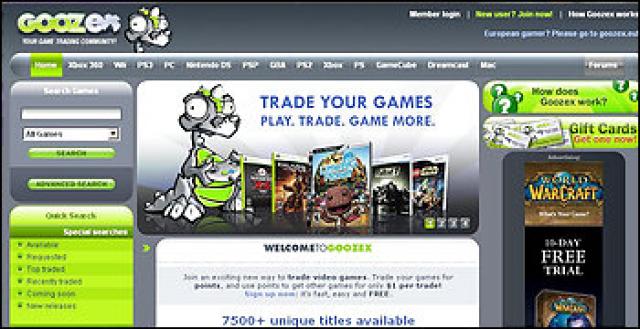
In the past couple of weeks, my mail carrier has brought me nearly new copies of Gears of War 2 and the latest Call of Duty, a couple of video game blockbusters released this past holiday season.
These two hit titles would’ve cost me $120 at retail, but through a locally based used-game trading service called Goozex, I just forked over about 10 bucks worth of postage and fees as I mailed away a few old game titles from my personal collection to some other Goozex members who had requested them, just as I’d requested those two action games via the service. Not a bad deal, in my estimation.
Video game makers argue that their entertainment form gives its customers more bang per buck than any other medium. I squeezed about 100 hours of entertainment out of the recent hit Fallout 3, for example, and still didn’t manage to complete every storyline packed on the game’s disc. But at $60 a pop for a new title, this doesn’t always feel like an inexpensive pastime. What’s more, some of this medium’s biggest fans are young and don’t have deep pockets to fund their gaming habits.
So it’s perhaps not surprising that the used-video-game market has become a big business unto itself. GameStop, the dominant player in this market, recorded $2 billion in used-game sales last year. That’s compared with a total new-game software market in the United States of $11.7 billion.
GameStop has ruled this market for years without much competition — as much as I like Goozex, it’s a tiny player in comparison. But others are moving in. When Amazon announced Thursday that it would be entering this fray, allowing customers to send in their old games for credit, GameStop’s share price dropped 14 percent by the end of the day. Toys R Us also recently launched a test program for selling used games at a few of its stores in New York.
With the profit margins GameStop enjoys from its used-game business, other retailers understandably would try to break into this space. A popular, brand-new game like Halo Wars, released last week, typically costs $60. If you decide to sell it back to GameStop once you’re finished or bored with it, you are likely to get $35 of store credit toward your next purchase. The store will typically then put your used game on the shelf with a price tag of $55.
For retailers, those kinds of profits are "nirvana," said Evan Wilson, an industry analyst with Pacific Crest. "It’s nearly impossible to get those margins at retail."
As GameStop has grown, Wilson said, the game industry’s attitude about the retailer has changed. A few years ago, it was generally assumed that used-game trade-ins gave kids a bit of spending capital that went toward the purchase of new products. As the economy has soured, however, the retail chain that is one of the industry’s biggest customers is also starting to look like its biggest competitor. Publishers don’t make money off the sale of a used title, after all.
Seems to be a touchy issue. GameStop did not return calls or e-mails for comment last week. The game publisher Electronic Arts declined to comment on the relationship between its business interests and those of GameStop. The Washington-based video game industry trade group, the Entertainment Software Association, also declined to comment on the matter.
Eventually, the game industry hopes to distribute its wares digitally — a move that could either cut retailers like GameStop out of the loop or simply provide gamers with more incentive to hold on to their old game discs. One of the biggest releases so far this year has been a downloadable expansion to the most recent Grand Theft Auto title. Called The Lost and Damned, the $20 add-on gives players access to several hours of fresh content. It’s one of the most positively reviewed releases of the year so far — but you can’t play it if you sold your copy of the game disc last year after finishing it.
In the meantime, in these penny-pinching times, it seems logical enough that more cost-conscious customers would consider turning to used games offered at GameStop or through services like Goozex. While Goozex launched a few years ago aimed at hardcore gamers, co-founder Mark Nebesky says a fast-growing segment of its membership is parents getting games for their kids.
Though relatively small, the College Park-based Goozex is growing quickly. The start-up makes a buck off each trade, and users conducted 160,000 trades in 2008, up 300 percent from the year before.
Goozex user Allyson Alt, a Friendship Heights resident, has used the service to trade hundreds of games over the past few years. The 31-year-old default mortgage underwriter now regards people who trade in their old games at retail stores as "idiots."
"I can’t tell you the last time I bought a new video game," she said.

Leave Your Comments